
Speed Busters is a video game developed by Ubisoft's Montreal studio for Microsoft Windows in 1998. It was released for the Dreamcast in 1999 as Speed Devils. This racing game features courses with hazards such as dinosaurs, rolling boulders, and UFOs set in exotic locales, including Louisiana, Louisiana Tornado, New York City, New York City Winter, Mexico, Nevada, Aspen Summer, Aspen Winter, Canada, Canada Light Winter, Canada Heavy Winter, Montreal Industrial, Hollywood, and Hollywood Disaster. The console version's career mode allows players to advance through the ranks of a fictional racing league. Colorful rivals challenge players to accomplish specific feats during races, placing bets using prize money earned from competitions. The money earned from gambling and performance is used to purchase cars, upgrade them, and maintain them. The game also supports up to five players on a single Dreamcast console.

4x4 Evo is a video game developed by Terminal Reality for the Windows, Macintosh, Sega Dreamcast, and PlayStation 2 platforms. It is one of the first console games to have cross-platform online play where Dreamcast, Macintosh, and Windows versions of the game appear online at the same time. The game can use maps created by users to download onto a hard drive as well as a Dreamcast VMU. All versions of the game are similar in quality and gameplay although the online systems feature a mode to customize the players' own truck and use it online. The game is still online-capable on all systems except for PlayStation 2. This was Terminal Reality's only video game to be released for the Dreamcast.

F355 Challenge is a 1999 racing simulation video game developed and published by Sega for arcades. It was developed for the Sega Naomi Multiboard arcade system board and was later ported to the Dreamcast and PlayStation 2 home video game consoles under the names F355 Challenge: Passione Rossa and Ferrari F355 Challenge respectively for both American and European releases. The only model of car featured in the game is the Ferrari F355 Challenge model. Unlike Sega's other arcade racers like Out Run titles, F355 Challenge aimed to be realistic. The game was considered the most accurate simulation of the F355 possible up until that time.

Sega Rally 2 is an arcade racing game developed by Sega for the Model 3 arcade hardware. It is the sequel to 1994's Sega Rally Championship. The game was first released in arcades in February 1998, and was later ported to the Sega Dreamcast, becoming one of the console's earliest titles when it was released in Japan on January 28, 1999. The Sega Dreamcast version was released in Europe as a launch title on October 14, 1999, and then in North America on November 27. A PC version was released in Japan and Europe that same year, with the North American release following suit in November 29, 2000, where it was published by Mattel Interactive.
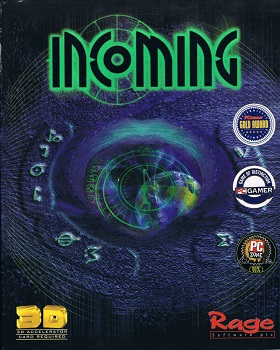
Incoming is a 3D shooter video game developed and published by Rage Software. The game was first released for Microsoft Windows in mid-1998, and was followed by a Dreamcast version, which was released in Japan on December 17, 1998, in Europe on October 14, 1999, and in North America on September 15, 1999. Set in the near-future of 2009, the game primarily revolves around controlling vehicles and turrets to fight alien invaders of Earth in one of the campaign modes, the arcade mode, and with or against another player. Some levels include brief real-time strategy segments.

S.C.A.R.S. is a 1998 sci-fi themed futuristic racing video game developed by Vivid Image and published by Ubi Soft for PlayStation, Nintendo 64, and Microsoft Windows.

TrickStyle is a futuristic racing video game developed by Criterion Games and published by Acclaim Entertainment for the Dreamcast and Microsoft Windows. Set in the future, the player takes part in stunt-filled hoverboard races through London, Tokyo, and Manhattan, or inside a massive arena called the Velodrome. AirBlade by Criterion and Namco is a spiritual successor. The game received mixed reviews from critics, who praised its graphics and physics, but criticized its gameplay, animations and sound.
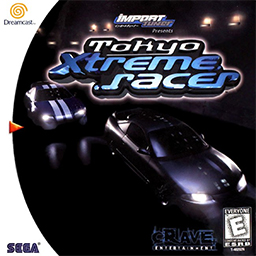
Tokyo Xtreme Racer, known as Shutokō Battle in Japan and Tokyo Highway Challenge in Europe, is a 1999 racing video game by Genki, for Sega's Dreamcast console. Released as a launch title in the West, the game was one of the first mission-based racing games; it is based on illegal highway racing in Tokyo's Wangan highway with custom tuned cars. It was the second title in the Shutoku Battle/Tokyo Xtreme Racer series to be released in the West following Tokyo Highway Battle (1996).

Armada is a video game developed and published by Metro3D. It was released for the Sega Dreamcast in North America on November 26, 1999. Armada is a shooter role-playing game (RPG) that allows up to four players to fly about the universe, fighting the enemy, performing missions and improving their ship.
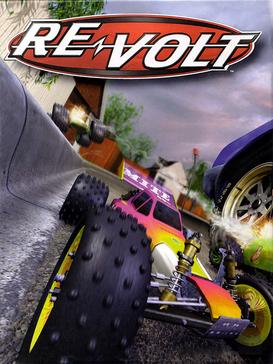
Re-Volt is a racing video game designed by Paul Phippen and Simon Harrison. It was developed by Acclaim Studios London and published by Acclaim Entertainment for Microsoft Windows, Nintendo 64, PlayStation and Dreamcast.
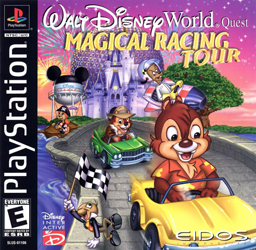
Walt Disney World Quest: Magical Racing Tour, sometimes mislabeled as Disney MT Racing or Walt Disney World: Magical Racing Quest, is a 2000 go-kart racing video game developed by Crystal Dynamics. Set within the real-life Walt Disney World, the game centers on racing around tracks that are inspired and based on attractions at the resort's theme parks to acquire missing parts for the park's fireworks machine, which was accidentally destroyed by Chip 'n' Dale while they were gathering acorns.
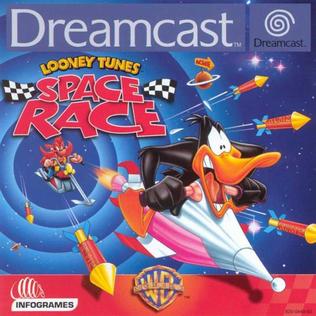
Looney Tunes: Space Race is a 2000 kart-racing video game published by Infogrames for the Dreamcast and developed through Infogrames' own Melbourne House studio. A version of Nintendo 64 was developed, but it was never released. It was ported to PlayStation 2 in 2002 with a new tournament mode and different soundtrack.

South Park Rally is a kart-style racing video game released in early 2000 based on the American animated sitcom South Park published by Acclaim Entertainment and released for the PlayStation, Microsoft Windows, Nintendo 64, and Dreamcast. Gameplay follows the player in a competitive racing championship set in the fictional town of South Park. Players are given the options for multiplayer, arcade, or championship modes, but only the championship unlocks extra features. Competition begins in South Park's 1st Rally, a circuit race around four checkpoints in the downtown area of South Park. Races get gradually more diverse, with more locations, racers, and elements added as the game progresses.

F-1 World Grand Prix, developed by Paradigm Entertainment, is a Formula One racing game/sim first released in 1998 for the Nintendo 64 game console and to later platforms including the Sega Dreamcast, Microsoft Windows, Sony PlayStation, and Game Boy Color. The Nintendo 64 version is based on the 1997 Formula One season, featuring each of the 17 circuits from the season and all 22 drivers, with the exceptions of Jacques Villeneuve and the MasterCard Lola team.

Monaco Grand Prix: Racing Simulation 2, also known simply as Monaco Grand Prix or Racing Simulation: Monaco Grand Prix, is a Formula One racing game developed and published by Ubisoft for Windows, Nintendo 64, PlayStation, and Dreamcast. It was released between 1998 and 1999. A sequel, Racing Simulation 3, was released in 2002.
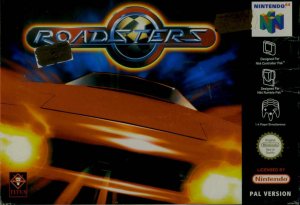
Roadsters is a racing game released by Titus Software for Nintendo 64 in 1999, and for PlayStation, Dreamcast and Game Boy Color in 2000. It is a car racing game that features both licensed cars from manufacturers and unlicensed cars from imaginary manufacturers that are based on and bear great resemblance to their equivalent, real car models. The game also includes a multi-player mode supports up to 2 human players that can compete in any of the available circuits with 4 more CPU controlled racers. A PlayStation 2 version was originally planned to release on April 11, 2001. Box art for unreleased PS2 game url=https://www.ign.com/games/roadsters

Test Drive 6 is a racing video game developed by Pitbull Syndicate for PlayStation, Microsoft Windows and Dreamcast. In the United States the game was published by Infogrames North America, while in Europe the game was published by Cryo Interactive. The game featured 37 licensed cars, plus four police car variants. As a first for the series, cars from General Motors are not playable in this game, instead they appear as traffic cars. The soundtrack featured industrial rock and techno music from artists such as Fear Factory, Lunatic Calm and Cirrus.

Demolition Racer is a 1999 vehicular combat racing video game for the PlayStation, Dreamcast, and Microsoft Windows, developed by British studio Pitbull Syndicate and published by Infogrames North America.

Spirit of Speed 1937 is a racing video game developed by Broadsword Interactive. The game was originally released in 1999 exclusively in Europe by Hasbro Interactive, who released the game under the MicroProse brand name. In 2000, the game was ported to the Dreamcast, and was published by Acclaim Entertainment under the LJN banner, the final game published with this label, five years after LJN was shut down by Acclaim. This version saw a North American release, and was released there on June 27, 2000. Spirit of Speed 1937 takes place in 1937, when motorsport was in its infancy.

Renegade Racers is a racing video game developed by Promethean Designs and published by Interplay Entertainment for PlayStation and Windows in 1999–2000.




















